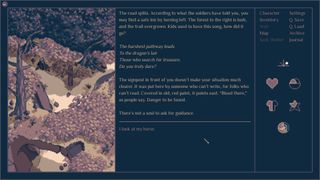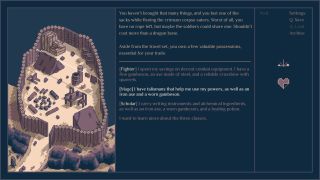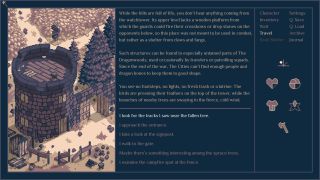Roadwarden is the first text adventure I enjoyed as much as a good book
Roadwarden is far more approachable than classic text games with worldbuilding on par with my favorite novels.


In addition to our main Game of the Year Awards 2022, each member of the PC Gamer team is shining a spotlight on a game they loved this year. We'll post new personal picks, alongside our main awards, throughout the rest of the month.
Despite my love of fantasy books and games I've rarely clicked with text adventures, though not for lack of trying. I initially said that Roadwarden felt like cracking open a giant fantasy novel, and if it were I'd now be hunting down a hardcover copy for a spot of honor on my shelf. Roadwarden nails the intersection between novel and adventure game in a way that, for the first time, doesn't make me wish it were just one of those other things instead.
Roadwarden makes an excellent first impression visually. There's no accounting for taste, but I'm personally not tired of the two-tone retro pixel illustration style and this is a lovely example of the form. It's not only the style that's approachable, but the visual design on the whole. Like much older dungeon crawlers, Roadwarden opts for a multi-panel design with text in the center, stats on the right, and an illustration of your surroundings that changes as you explore each area.

All the while there's ambient audio of chittering bugs or running water interspersed with the mellow acoustic guitar soundtrack that I've since been playing on repeat throughout my workdays. Its style is certainly what convinced me to give Roadwarden a chance, and its muted colors and chill soundtrack set the mood for what turned out to be an equally well-tuned adventure.
Less is lore
Roadwarden's key success is that it knows when to lean into its bookish qualities and when to play up its game-y capabilities. It handles worldbuilding through exposition the way a novel does—and a good novel, no less. All fantasy is prone to the proper noun problem, and fantasy action games, where lore is delivered so often in dialogue, even more than most. Roadwarden uses its scene-setting descriptions and the main character's internal thoughts to convey concepts like how a "shell" is just what folks call their bodies, that all animals are more dangerous than we're familiar with in our world, and the nuances of tension between the different human faiths. It's all subtly done, with comparable skill to some of my favorite authors.
And that's where other text adventures and visual novels have gone awry for me in the past. If it's as well-written and engaging as a book, I'll wish it were one, and not something I had to experience sitting at my desk. But Roadwarden's narrative tension, and my character's place in it, are excellently gamified. On normal difficulty, I have only 40 days to learn as much as I can and sort out the peninsula's problems before reporting back to my merchant guild clients. Traveling to any point on the map takes time, and can take longer in poor weather, and although those 40 days initially feel like plenty, the final 10 really made me question how my time was best spent and who I could truly pry the answers I needed from.

After choosing a difficulty setting that determines my time limit and one of three character classes, Roadwarden begins in choose-your-adventure style: offering chunks of exposition about the nameless peninsula I've been sent to, followed by my choice of how to proceed from a list of actions. I can approach the seemingly abandoned fort I've come across with caution or waltz boldly in.
Conversations come in familiar RPG trees of information-gathering questions and occasional tone-based moments where I can choose to be friendly, playful, distanced, intimidating, or vulnerable. Later on these decisions carry more weight, changing how certain characters treat me and how willing they are to have information about the peninsula's mysteries pried from them. Its characters are as shrewd as their world demands of them, hiding details from me when I stumbled into conversational mistakes like commenting on a headwoman's wealth, but their opaqueness always enticed me into uncovering them.
The biggest gaming news, reviews and hardware deals
Keep up to date with the most important stories and the best deals, as picked by the PC Gamer team.
By the end of the 40-day time limit I'm supposed to have finished my survey of the peninsula for my clients: brokering initial talks with the four towns to make way for formal agreements with the trade guilds, clearing out dangerous animals and other risks on the road, and uncovering the secrets that its inhabitants are eager to keep from outsiders. After that, I travel back to give my report and hear the outcomes of my choices for everyone I met.

I spent about 10 hours on my first playthrough, cautiously avoiding what I believed were risky choices, and it turned out I'd totally failed to secure any trade agreements, missed two locations entirely, and learned little that my employers considered of value. But the journey was so enticing and the puzzles of its characters thrilling to unpick that I immediately started another adventure after the first to fix my biggest mistakes, playing aggressively and for keeps this time.
If I can give one piece of advice, choose a fighter as your first class. Mine picked up on a crucial clue in the early game that my mage didn't. And consider using the "casual" difficulty. The mysteries get tense even without the time limit.
Most years I wind up liking a handful of games I'd already anticipated enjoying. Roadwarden is one of the special experiences: a game I had reservations about that totally snared me.

Lauren has been writing for PC Gamer since she went hunting for the cryptid Dark Souls fashion police in 2017. She accepted her role as Associate Editor in 2021, now serving as self-appointed chief cozy games and farmlife sim enjoyer. Her career originally began in game development and she remains fascinated by how games tick in the modding and speedrunning scenes. She likes long fantasy books, longer RPGs, can't stop playing co-op survival crafting games, and has spent a number of hours she refuses to count building houses in The Sims games for over 20 years.
Most Popular

